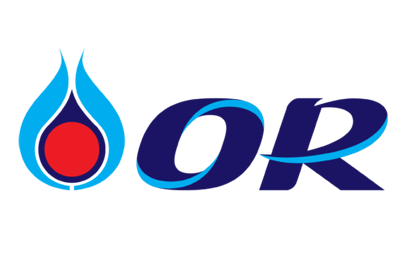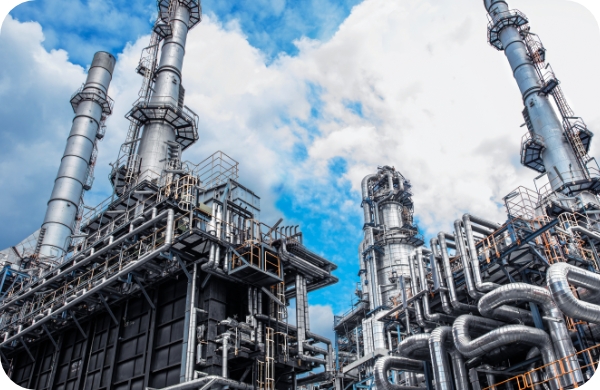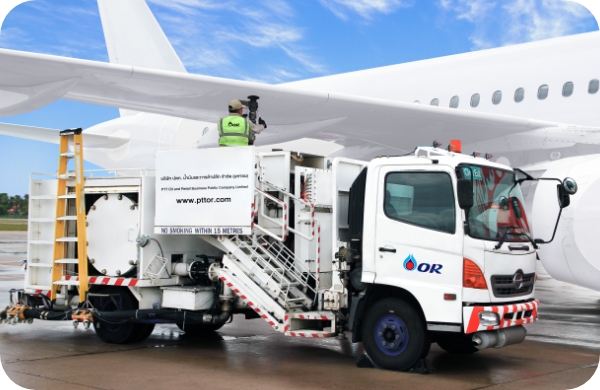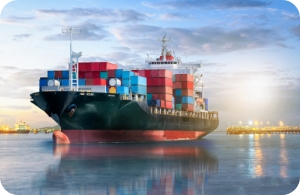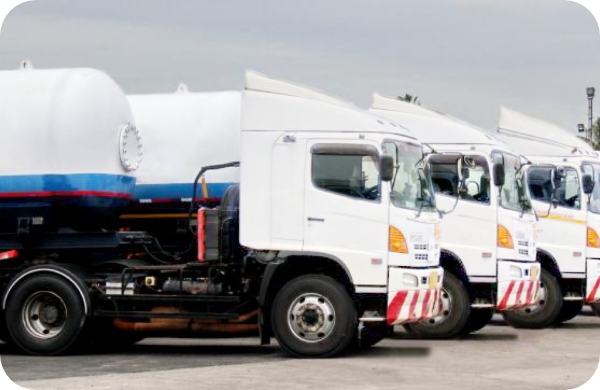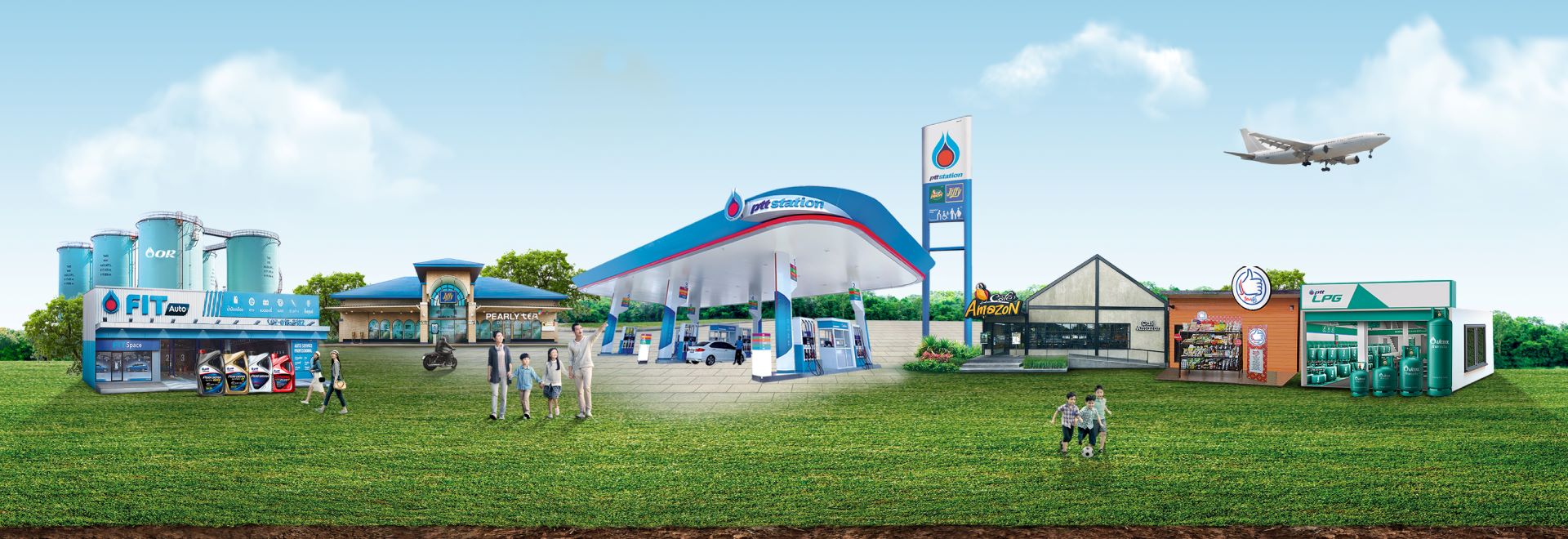
Rest assured with Our Standard, Premium Service with Our Efficiency, Enhanced Capability of the Thai Industry
With years of fuel supply to nationwide industrial plants, OR is a proven leader in primary fuel products and services, with a focus on meeting premium product standards defined by the Department of Energy Business. We also develop new fuels with social and environmental responsibility, offering options for factories to save energy while being green. Moreover, OR offers specialty products, related products, and byproducts from refineries and other sources to accommodate all industrial needs.
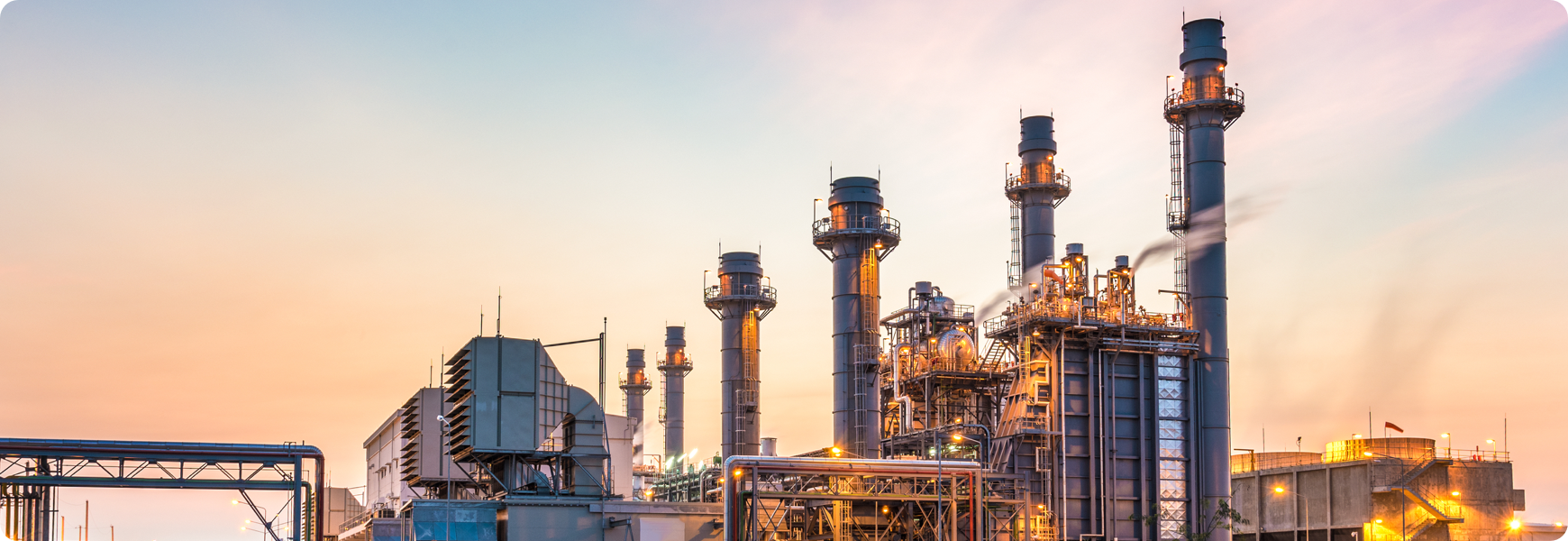
- Number 1 fuel oil (also known as Class A fuel, or fuel oil 600, 2% sulfur) is a high-quality fuel oil with low viscosity. It is convenient for use and suitable for small to medium factories and other businesses, such as hotels and hospitals situated in communities, thanks to its complete combustion and low soot with minimum impact on the environment.
- Number 2 fuel oil (also known as Class C fuel, or fuel oil 1500, 2% sulfur) has moderate viscosity and is fit for medium to large factories with efficient combustion system and machinery. This fuel has been used most extensively and costs less than Number 1 fuel oil (Class A fuel).
Premium Fuel Oil contains additives to lower emissions, reduce maintenance requirements, improve efficiency, and is environmentally friendly. This product can be used as an excellent substitute for both Number 1 and Number 2 fuel oils. - High-speed diesel is used in diesel engines with speeds over 1,000 rpm, such as transport vehicles, trucks, trains and pick-up trucks. It is also used as fuels in factories, such as in boilers or direct burns. To date, high-speed diesel has been modified with ethanol blending to preserve nature, including B7, B10 and B20.
- Liquefied petroleum gas (LPG) for industry consists of propane and butane gas mixtures at appropriate proportions, liquefied under thai pressure. LPG is produced from processing in gas separation plants (GSPs) or from oil refining process in oil refineries. OR’s LPG is mainly produced from GSPs, resulting in a higher blend of propane (C3) and thus considered higher quality and cleaner than LPG produced by other producers due to its lower emissions and less contamination stain on machinery parts.
- Propane gas is produced from GSPs. It is used in abnormally high and stable temperature combustion, such as in television tube manufacturing.
- CNG (Compressed Natural Gas) is an alternative fuel for fuel oil and LPG. It is clean and pollution-free, suitable for industries located further from gas pipeline networks.
LNG (Liquefied Natural Gas) is an alternative fuel for fuel oil and LPG. Natural gas is liquefied with extreme cooling to -160 degrees Celsius for storing and shipping at sizeable volumes and longer distances. LNG is a clean, colorless, odorless and toxic-free form of energy. Refrigerants and chilled waters are byproducts of its production process.
Automotive lubricants are products of lubrication technology for diesel vehicles that aims for high performance and fuel efficiency – low in noise, vibration, pollution and maintenance requirements but high in durability.
- Industrial lubricants are lubricants customized for industrial uses.
- Specialty lubricants are lubricants specifically developed by PTT Innovation Institute for specific industrial requirements.
Lube base oil is feedstock lube oil that is blended with additives to produce a variety of lubricants.
– Process oil is an additive used in production processes such as rubflex and rubflo oil groups.
- Asphalt is produced by refineries under industrial standards and certified by the Department of Highways. Supply management ensures adequate volumes, with logistical supervision from sources to sites.
- Condensate is natural gas in gaseous state under the subsurface environment but becomes liquid at the earth surface. It is distributed to be processed by plants in distillation towers similar to the common natural gas separation process.
Sulfur is a byproduct of refineries used in making industrial compounds.
- Ammonia is a chemical compound used in a variety of manufacturing processes, such as MSG or seasoning powder, fertilizers, cleansing substances, feedstock for processes requiring nitrogen composition, latex industry, metallurgy industry, and refrigerants. PTT Group is the largest importer of ammonia who stores and distributes it to industrial customers.
- Methanol is imported and distributed by OR to manufacturers of B100, vegetable oils, paints, adhesives, and others.
Solar rooftop is a photovoltaic system installed on rooftops to generate electricity. It saves energy costs for customers and reduces CO2 emission to the atmosphere.
Customer Services
OR aims to become an Energy Solution Provider – supporting customers with consultation on fuel consumption and alternatives by proficient engineers. OR also has a program for calculating fuel consumption and fuel comparison, providing customers with the best fuel solutions. The program can calculate other parameters from customers’ perspectives, such as NPV, payback, IRR, carbon credit compared with planting trees, API (without having to rely on tabulated sources), LPG flow in pipeline, and investment requirement estimation. OR also provides equipment packages for lease to customers who want to avoid making capital investment.
Work process on Energy Solution Provider
- Survey: Collect data on energy usage, acreage, problems, requirements, surrounding conditions, budgets, targets of the plant or the customer – all aspects of information are collected as inputs for energy consumption design
- Design: Design and select optimal energy solutions for cost-saving, optimal value, and meeting customers’ demand. Design service covers design acreage, systems and equipment with due regard for legal, budget and environmental requirements.
- Advisory: Provide comparative data on energy, on-site problem analyses, training services, and consultation on legal application of licenses.
- Installation: Provide experienced outsources and supervise construction under standard control.
- Commissioning: Conduct usability test to ensure system operates as designed and conduct environmental quality inspection before customer handover.
- After-sales services: Provide system and equipment care and maintenance throughout the contract period and provide consultation on engineering and compliance.
Product Delivery Management
l energy supply security, OR has built oil depots across the country, providing readiness for energy inventory and distribution to customers nationwide. Should any depot or service station be out of service, other depots can immediately respond for alternative delivery without interruption or loss to OR’s customers.
Quality and timely delivery
Strictly adhering to the principle that customers must always receive good products, meaning high quality, correct, complete and on-time delivery, OR has installed a satellite signal transmission system on product transport vehicles to monitor all travel with continuous reports. It has also installed the Track-co Graph system to monitor speed and lapse time.
Product quality control and petroleum product quality inspection services
OR has a quality control system and laboratories certified by ISO/IEC Guide 25 that conduct fuel quality inspection to meet the requirements of the Ministry of Commerce. Inspections are done before receiving fuels into OR’s depots and distribution to customers. Additionally, OR conducts random fuel inspection both at OR’s depots and at customers’ plants and provides inspection reports to customers to provide quality guarantee and foster confidence in OR’s products.
Product and application safety education
Provide education on petroleum products and machinery maintenance by well-versed engineers to support fuel decisions and improve safety for customers and public properties. Provide tours to oil refinery facilities and GSPs for an understanding about production processes and safety standards.
Steam boiler efficiency assessment service
Conduct efficiency assessment service for steam boilers by engineering expert teams, report assessment results and provide recommendations to maximize customers’ efficiency, including energy saving, extending machinery life, safeguarding the environment, and reducing air pollution resulting from incomplete combustion exhaust.
Consultation service on equipment construction or renovation
With our expertise in designing and constructing fuel storage equipment, OR gladly provides complimentary consultation in designing and renovating sites or equipment used for fuel storage. Our consultation includes advice on applying for Licenses to Operate Fuel Storage Facilities as regulated by the Department of Energy Business, Ministry of Energy.
Additional services related to other developments
To improve product quality and increase productivity in different aspects of the industry sector, OR also offers services including
* Provision of expert 5S training (Thai version of Organization, Orderliness, Cleanliness, Standardization, and Discipline) and QSHE to improve productivity.
* OR’s research and technology institute with extraordinary capability and state-of-the-art petroleum technology.
* Provision of expert consulting services and solutions to various industries on energy conservation.
For inquiries or product orders
Please contact: Industrial Sales Division, Tel 02-196-5361, Fax 02-196-5360
Specialty Product Sales Division, Tel 02-196-5330, Fax 02-196-5356
Site map
- About
- Organization
- Career
- Oil Business
- - Retail Energy Solution
- - Commercial Business
- Retail Business
- Services
- International Business
- Business Opportunity
- Sustainability
PTT Oil and Retail Business Public Company Limited
555/2 Energy Complex Building B, 12th Floor, Vibhavadi Rangsit Rd., Chatuchak, Bangkok 10900
© 2024 OR Tel : 02 196 5959
